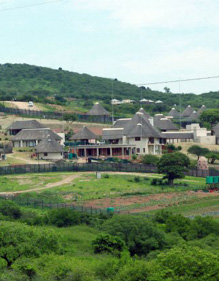|
Getting your Trinity Audio player ready...
|
 On 30 September, City Press reported that the Department of Public Works had approved a budget in March in 2011, to revamp President Zuma’s private residence in Nkandla, in KwaZulu-Natal. Proposed renovations include building helipads, sports fields, underground bunkers and fencing the entire complex.
On 30 September, City Press reported that the Department of Public Works had approved a budget in March in 2011, to revamp President Zuma’s private residence in Nkandla, in KwaZulu-Natal. Proposed renovations include building helipads, sports fields, underground bunkers and fencing the entire complex.The article caused a huge public outcry, to which Nxesi initially responded by saying that the upgrade was in line with the Ministerial Handbook. It authorised the state to pay for security-related renovations of the private residences of Cabinet ministers, he said, adding that the Nkandla homestead was a “national key point” and that information relating to such a key point was protected by the National Key Points Act.
Corruption Watch writes to Nxesi
On 4 October, a week after the City Press report, Corruption Watch wrote to the Department of Public Works seeking clarity. Corruption Watch referred to the interpretation of Annexure E of the Ministerial Handbook by Constitutional law expert Pierre de Vos, that the maximum amount that could be contributed by the state towards security measures at the private residences of Cabinet ministers was R100 000.
The organisation sent the minister a list of questions to ascertain whether the department had indeed approved the R203-million upgrade of the Nkandla homestead.
Read Corruption Watch’s full letter here.
The department was given until Friday, 12 October to respond to Corruption Watch’s questions. When Nxesi did not respond, the organisation wrote another letter, dated 15 October, urging the department to respond. The department responded in writing on the following day, on 16 October.
Nxesi responds to Corruption Watch
In his response, Nxesi said that when Zuma was elected president, it was understood that his security would have to be beefed up. An expert team comprising members of the departments of Police, Defence and State Security reviewed the state standards for the security of dignitaries.
As a result, new capacity was requested for Nkandla, in and surrounding the private residence of President Zuma, the letter read. The minister asserted that the upgrade was in line with the Ministerial Handbook, which provided that his department would be responsible for the “security arrangements for private residence used for official purposes”.
He explained that Annexure E of the handbook dealt with security measures at the private residences of public office bearers only, and that because Nkandla was used for private and official purposes, Annexure E did not apply to it.
He denied claims made in the media that the renovations cost R203-million, adding that such information could not be disclosed as it was classified.
Read Nxesi’s full response here.
Nxesi response inadequate
Then, on 26 October, Corruption Watch responded to Nxesi’s letter, saying that his response was inadequate. “Your response fails to address the concerns raised in the media about the Nkandla homestead upgrade, which are concerns echoed by members of the public that report to Corruption Watch,” the organisation said.
In this letter, it called for further engagement with the department in an on-going attempt to promote transparency. However, the department has neither responded to the organisation’s third letter nor acknowledged receipt of it.
Read Corruption Watch’s full third letter here.
Civil society and media response to National Key Points Act
Rights group Right2Know Campaign has condemned the minister for invoking the apartheid-era National Key Points Act to avoid answering questions on the Nkandla upgrade. It believes that this law is unconstitutional and has provided too much cover for politicians and officials who want to abuse “national security” imperatives to protect themselves and their actions from public scrutiny.
On 4 October, Right2Know launched an access to information request, using the Promotion of Access to Information Act (PAIA), for the minister of police to reveal the list of national key points across South Africa.
In early July, the Mail & Guardian Centre for Investigative Journalism, amaBhungane, launched a PAIA application for financial and contracting records relating to the Nkandla upgrade. In August, the department refused the request, saying that the information was classified because Nkandla was a national key point.
What Corruption Watch plans to do
Corruption Watch will continue to use its reporting platforms to encourage and receive reports about the abuse of public resources. The organisation will also publicise any further engagement with the Department of Public Works in the spirit of transparency and sharing of information. It will also continue to monitor the department’s responses to the PAIA requests initiated by other civil society organisations and media houses.
Corruption Watch is not only interested in the scale of funding, even if the R203-million was justifiable to upgrade Nkandla; the question remains whether the rules were followed in procuring these goods and services. Is the massive expense of the renovations partly attributable to corruption or maladministration in the procurement process?
The organisation will continue to pose questions about whether the money was all spent on upgrading security and whether correct the tender processes were followed.
Image

Excerpt
In the past month, Corruption Watch has written a series of letters to Public Works Minister Thulas Nxesi seeking an explanation for and clarity on the department’s reported plan to spend R203-million upgrading President Zuma’s private residence in Nkandla.
File Upload
File Upload
File Upload
File Upload
File Upload
File Upload



